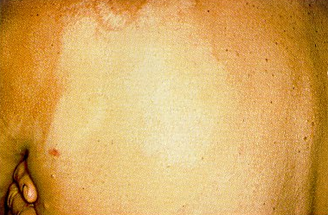Mogamulizumab Offers Novel Approach to Peripheral T-Cell Lymphoma
A phase II trial of mogamulizumab showed that the agent has meaningful antitumor activity in patients with relapsed peripheral T-cell lymphoma and cutaneous T-cell lymphoma, and acceptable toxicity.
Patch/Plaque Cutaneous T-Cell Lymphoma, Hypopigmented Variant

A phase II trial of mogamulizumab showed that the agent has meaningful antitumor activity in patients with relapsed peripheral T-cell lymphoma (PTCL) and cutaneous T-cell lymphoma (CTCL), and acceptable toxicity.
Several chemotherapy regimens are approved for these malignancies, but those patients who do achieve remission relapse and have generally poor outcomes. Mogamulizumab, which is approved only in Japan, is a monoclonal antibody targeting CC chemokine receptor 4 (CCR4). CCR4 is expressed on tumor cells in 30% to 65% of PTCL patients, and CCR4-positive patients have shorter survival than those not expressing the protein.
In the new study, led by Michinori Ogura, MD, PhD, of Nagoya Daini Red Cross Hospital in Nagoya, Japan, 37 patients with relapsed CCR4-positive PTCL or CTCL received IV mogamulizumab 1 mg/kg once per week for 8 weeks. The results were published online ahead of print on March 10 in the Journal of Clinical Oncology.
The investigators observed objective responses to mogamulizumab in 13 of 37 patients (35%). Five of those patients (14%) achieved a complete response. The median progression-free survival was 3 months, and median overall survival for the full cohort was not reached; specifically for those with PTCL the median overall survival was 14.2 months. The overall response rate was 34% in patients with PTCL, and 38% in those with CTCL. The median progression-free survival for the 13 responders was 5.5 months, and 8.2 months for the PTCL responders.
The most common grade 3/4 adverse events were lymphocytopenia, neutropenia, and leukocytopenia. Treatment-related skin disorders were also common, and 24% of patients had an infusion reaction, generally on the first infusion. There were 15 “serious” treatment-related adverse events in eight patients, including grade 3 polymyositis, grade 4 second primary malignancy, and grade 2 cytomegalovirus retinitis. There were no deaths related to adverse events.
“This phase II study revealed that mogamulizumab had promising efficacy and tolerability in patients with relapsed CCR4-positive PTCL and CTCL,” the investigators concluded. “Given its novel mechanism of action and favorable toxicity profile compared with multiagent cytotoxic chemotherapy, we might expect the use of mogamulizumab in combination with other agents. Further preclinical and clinical studies of combination therapy will be needed.”
Study Details
The median age of patients in the study was 64 years, and 62% were male. Patients had a median of 2 previous systemic regimens, with 8 of the patients having received at least three such regimens. Nine had also undergone radiotherapy before entering this study. Twenty-four patients had an ECOG status of 0, twelve were ECOG 1, and one patient was ECOG 2.